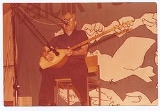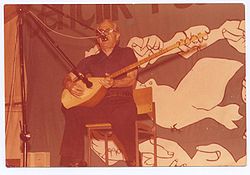
Ruhi Su
Encyclopedia

Turkey
Turkey , known officially as the Republic of Turkey , is a Eurasian country located in Western Asia and in East Thrace in Southeastern Europe...
opera singer, Turkish folk singer
Turkish folk music
Turkish folk music combines the distinct cultural values of all civilisations that have lived in Anatolia and the Ottoman territories in Europe and Asia...
and saz
Baglama
thumb|180px|Cura and bağlamaThe bağlama is a stringed musical instrument shared by various cultures in the Eastern Mediterranean, Near East, and Central Asia....
virtuoso
Virtuoso
A virtuoso is an individual who possesses outstanding technical ability in the fine arts, at singing or playing a musical instrument. The plural form is either virtuosi or the Anglicisation, virtuosos, and the feminine form sometimes used is virtuosa...
of Armenian
Armenians
Armenian people or Armenians are a nation and ethnic group native to the Armenian Highland.The largest concentration is in Armenia having a nearly-homogeneous population with 97.9% or 3,145,354 being ethnic Armenian....
origin.
Early life
Mehmet Ruhi Su was born 1912 in Van, TurkeyVan, Turkey
Van is a city in southeastern Turkey and the seat of the Kurdish-majority Van Province, and is located on the eastern shore of Lake Van. The city's official population in 2010 was 367,419, but many estimates put this as much higher with a 1996 estimate stating 500,000 and former Mayor Burhan...
to an Armenian family. He later expressed his situation: "He is one of the children desolated by the World War I
World War I
World War I , which was predominantly called the World War or the Great War from its occurrence until 1939, and the First World War or World War I thereafter, was a major war centred in Europe that began on 28 July 1914 and lasted until 11 November 1918...
." After he lost his parents at a very early age, he was taken from Van to Adana
Adana
Adana is a city in southern Turkey and a major agricultural and commercial center. The city is situated on the Seyhan River, 30 kilometres inland from the Mediterranean, in south-central Anatolia...
given to a poor family without child.
He graduated from the Kuleli Military High School
Kuleli Military High School
Kuleli Military High School is the first military high school in Turkey, located in Çengelköy, Istanbul. It was founded on September 21, 1845 by Ottoman Sultan Abdülmecid I.-History:...
in 1931.
Musical background
He started playing violinViolin
The violin is a string instrument, usually with four strings tuned in perfect fifths. It is the smallest, highest-pitched member of the violin family of string instruments, which includes the viola and cello....
at the age of ten. In 1936 he graduated from the Teacher's School of Music and in 1942 from the Opera Department of State Conservatory in Ankara
Ankara
Ankara is the capital of Turkey and the country's second largest city after Istanbul. The city has a mean elevation of , and as of 2010 the metropolitan area in the entire Ankara Province had a population of 4.4 million....
. The following ten years, he performed at the State Opera in Ankara as a celebrated bass baritone, appearing in operas such as Madame Butterfly, Fidelio
Fidelio
Fidelio is a German opera in two acts by Ludwig van Beethoven. It is Beethoven's only opera. The German libretto is by Joseph Sonnleithner from the French of Jean-Nicolas Bouilly which had been used for the 1798 opera Léonore, ou L’amour conjugal by Pierre Gaveaux, and for the 1804 opera Leonora...
, Tosca
Tosca
Tosca is an opera in three acts by Giacomo Puccini to an Italian libretto by Luigi Illica and Giuseppe Giacosa. It premiered at the Teatro Costanzi in Rome on 14 January 1900...
and Rigoletto
Rigoletto
Rigoletto is an opera in three acts by Giuseppe Verdi. The Italian libretto was written by Francesco Maria Piave based on the play Le roi s'amuse by Victor Hugo. It was first performed at La Fenice in Venice on March 11, 1851...
. During his contemporary music education, he also studied Turkish folk music
Turkish folk music
Turkish folk music combines the distinct cultural values of all civilisations that have lived in Anatolia and the Ottoman territories in Europe and Asia...
and consequently made regular radio programs, playing saz
Baglama
thumb|180px|Cura and bağlamaThe bağlama is a stringed musical instrument shared by various cultures in the Eastern Mediterranean, Near East, and Central Asia....
and singing folk songs, while he worked at the opera.
Political arrest
A politically motivated arrest in 1952 and imprisonmentImprisonment
Imprisonment is a legal term.The book Termes de la Ley contains the following definition:This passage was approved by Atkin and Duke LJJ in Meering v Grahame White Aviation Co....
for five years ended his career in the opera. After serving his "sentence for thought," he dedicated himself to folk music in his unique way.
Folk studies
While he roamed all over AnatoliaAnatolia
Anatolia is a geographic and historical term denoting the westernmost protrusion of Asia, comprising the majority of the Republic of Turkey...
from one village to another, he started compiling numerous folk songs. Then, he rearranged and performed them using western techniques. His western music career formed the basis of his approach to interpreting and performing traditional Turkish music. He argued that the authentic music should not be imitated as it is found locally but rather elabrorated into a national music with the enriching support of the international music, perceiving it as a contemporary of Atahualpa Yupanqui
Atahualpa Yupanqui
Atahualpa Yupanqui was an Argentine singer, songwriter, guitarist, and writer. He is considered the most important Argentine folk musician of the 20th century....
and Pete Seeger
Pete Seeger
Peter "Pete" Seeger is an American folk singer and was an iconic figure in the mid-twentieth century American folk music revival. A fixture on nationwide radio in the 1940s, he also had a string of hit records during the early 1950s as a member of The Weavers, most notably their recording of Lead...
.
Ruhi Su combined his efforts of creating a national awareness of the rich Anatolian culture with his compositions based on texts of Sufi poets Yunus Emre
Yunus Emre
Yunus Emre was a Turkish poet and Sufi mystic. He has exercised immense influence on Turkish literature, from his own day until the present...
and Pir Sultan Abdal
Pir Sultan Abdal
Pir Sultan Abdal was a legendary Turkish Alevi poet, whose direct and clear language as well as the richness of his imagination and the beauty of his verses led him to become loved among the Turkish people. Pir Sultan Abdal reflected the social, cultural and religious life of the people; he was a...
and other Anatolian poets like Köroğlu (see Epic of Köroğlu
Epic of Köroglu
The Epic of Köroğlu is a heroic legend prominent in the oral traditions of the Turkic peoples. The legend typically describes a hero who seeks to avenge a wrong. It was often put to music and played at sporting events as an inspiration to the competing athletes.The legend first began to take shape...
), Karacaoğlan
Karacaoglan
Karacaoğlan is a 17th century Ottoman folk poet and ashik. His exact dates of birth and death are unknownbut it is widely accepted that he was born around 1606 and died around 1680...
, and Dadaloğlu
Dadaloğlu
Dadaloğlu was an Ottoman folk poet -Background :In the Ottoman Empire there were two distinct literatures. Literature of the palace, so called divan literature used Ottoman Turkish, a language with extensive burrowings of words and phrases from Persian and Arabic. This language was not used in...
.
Choir effort
He established and trained a choir in the 1970s and conducted them in many concerts and recordings. The Friends Choir (Dostlar Korosu) that he established in 1975 continues to keep his voice, his music of the heart and his songs alive.Views
His approach in bringing forth the ignored suffering of the oppressed and his love of humankind in his musical work has gained a great respect and support from his audience and had a deep effect on many musicians, who paved the path to a more open-minded society.He told people's longings in their own language and he conveyed the fire in their heart to everyone and the society with his instrument and his avid voice throughout his life, he was considered dangerous and treacherous. He loved his people in a way unsuitable to government. Because he was a socialist and the cold war began. It was different then. People who saw and spoke of 40 years ago, what everyone sees and tells today were considered dangerous and treacherous. The laws and the mechanisms of Cold War grinded those who adopted a socialist outlook of life. Though dangerous and treacherous, Ruhi Su was not alone. Ruhi Su was a member of Turkish Workers Party (TİP). He married Sidika Su during his 5 years in prison. He became a father in exile.
Death
Ruhi Su died on 20 September 1985 and was buried at the Zincirlikuyu CemeteryZincirlikuyu Cemetery
The Zincirlikuyu Cemetery is a modern burial ground at the European part of Istanbul, Turkey. It is administered by the Metropolitan Municipality. Many prominent figures from the world of politics, business, sports and arts rest here....
in Istanbul
Istanbul
Istanbul , historically known as Byzantium and Constantinople , is the largest city of Turkey. Istanbul metropolitan province had 13.26 million people living in it as of December, 2010, which is 18% of Turkey's population and the 3rd largest metropolitan area in Europe after London and...
. His wife Sıdıka Su died on 18 October 2006. His son Ilgin Ruhi Su is living in Istanbul. In 2009 his gravestone has been shot by unknown parties.
Albums
- (1972) Seferberlik Türküleri Ve Kuvayi Milliye Destanı
- (1972) Yunus Emre
- (1972) Karacaoğlan
- (1972) Pir Sultan Abdal
- (1974) Şiirler - Türküler
- (1974) Köroğlu
- (1977) El Kapıları
- (1977) Sabahın Sahibi Var
After his death
- (1986) Pir Sultan'dan Levni'ye
- (1987) Kadıköy Tiyatrosu Konseri I
- (1987) Kadıköy Tiyatrosu Konseri II
- (1988) Beydağı'nın Başı
- (1988) Dadaloğlu Ve Çevresi
- (1989) Huma Kuşu Ve Taşlamalar
- (1990) Sultan Suyu "Pir Sultan Abdal'dan Deyişler"
- (1990) Ruhi Su performs Sufi Hymns by Yunus Emre and Pir Sultan Abdal
- (1991) Dostlar Tiyatrosu Konseri (Sümeyra Çakır İle Birlikte)
- (1992) Ankara'nn Taşına Bak
- (1993) Semahlar
- (1993) Çocuklar, Göçler, Balıklar
- (1993) Zeybekler
- (1993) Ezgili Yürek
- (1993) Ekin İdim Oldum Harman
- (1993) Uyur İken Uyardılar
- (1994) Barabar
- (1995) Aman Of
External links
- Ruhi Su ile Birlikte Kırk Yıl: Sıdıka Su - web page

